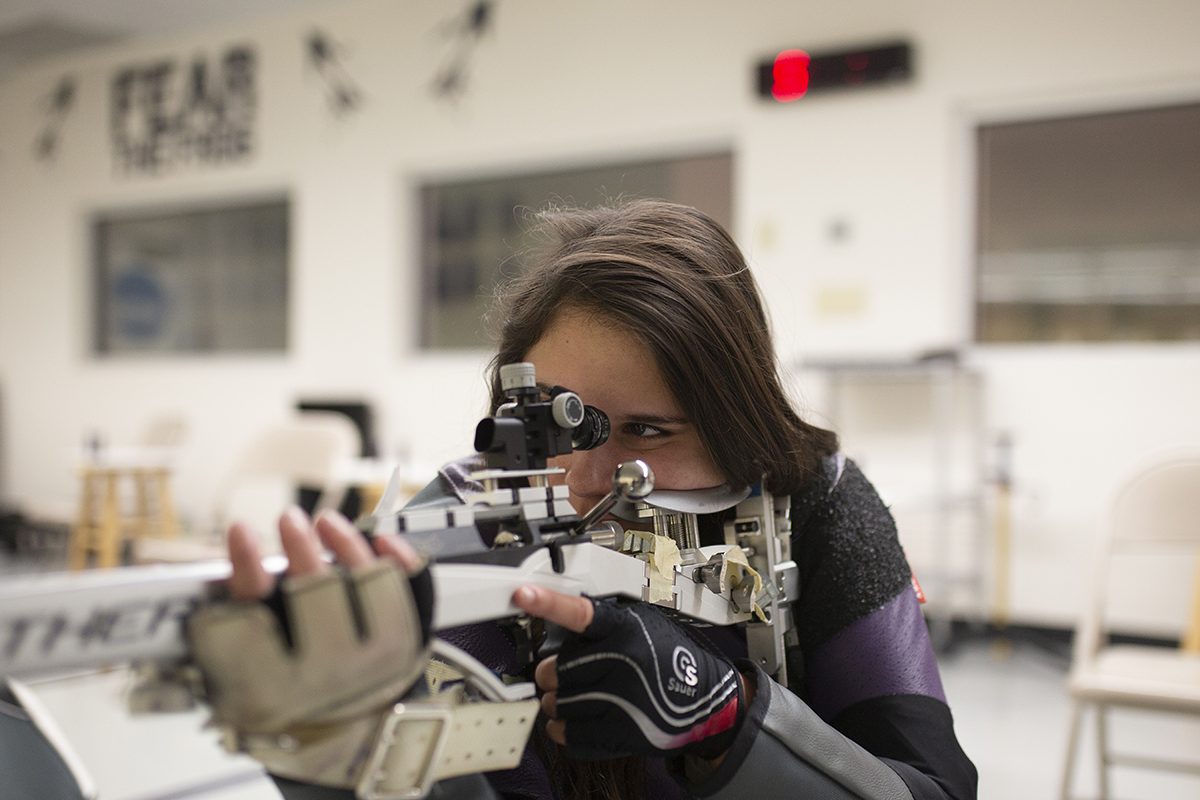
Rifle Team Hits the NCAA Target
The all-women team earned its third title in program history in March.
Lying on the floor of the West Virginia University Coliseum in Morgantown, Kristen Hemphill presses her rifle against her cheek. She eyes her target. She’s precise. She has shot a perfect 10 thousands of times.
While looking through her scope, Hemphill concentrates on her breathing. She thinks about her training, imagining the tiny lead bullet hitting the center of the target 50 feet away.
She pulls the trigger. The bullet explodes from the .22-caliber rifle’s barrel.
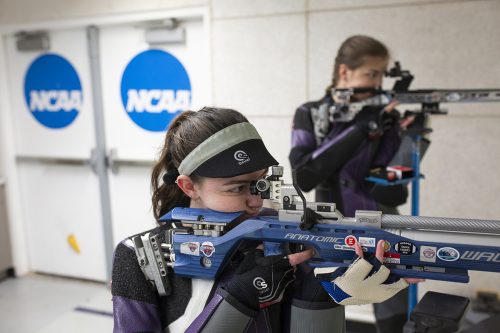
Kristen Hemphill and Rachel Garner aim their rifles during practice. Photo by Rodger Mallison
Hemphill’s name moves to the top of the scoreboard. She has just won the 2019 NCAA air rifle championship.
Hemphill’s contribution to the team score also helped earn TCU the national title at the NCAA finals.
“Everything I have worked for and a dream I have always wanted to accomplish had come true,” Hemphill said. “I started crying. That moment was one I will
never forget.”
TCU Rifle is one of the best in the nation. Between 2009 and 2013, the program had 41 uninterrupted regular-season wins. West Virginia University is the only other team in NCAA history to have a similar record.
In March, the all-female team won its third NCAA championship. The team broke six school records. TCU last won the NCAA smallbore trophy in 2013.
“The TCU team always comes in to perform to their full potential and sets themselves up to compete for the title,” said Launi Meili, head coach for U.S. Air Force Academy Rifle. “They have confidence and poise, and even if one of their shooters has an off day, they learn from that as a team, lift her up and come back stronger in the next competition.”
At TCU, Head Coach Karen Monez has led the team to the three national titles and sent multiple shooters to the Olympic Games or qualifiers.
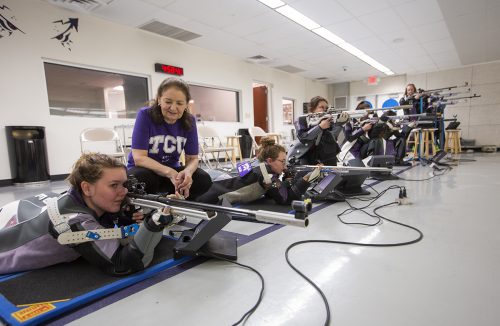
Head Coach Karen Monez advises the rifle team during practice. Photo by Rodger Mallison
For the 2018-19 season, five of the team’s 11 shooters were freshmen, including Hemphill. Monez told her shooters that previous teams had set the bar high. The coach said she wanted them to look at each match as a learning experience.
At the team’s first away match in September 2018, TCU Rifle shot against the U.S. Naval Academy. The team shot a score of 4,711, beating the favored Midshipmen. If a rifle team breaks a 4,700 score, Monez said, “that’s just solid shooting.”
“They walked away with a win and an outstanding score,” Monez said. “I thought, ‘OK, the bar is not set too high for this group. We’re going to have a good year.’ ”
Monez trains her shooters to have a mental toolbox that allows them to focus on individual skills, such as a positive attitude, ability to focus and goal-setting, while also emphasizing that they are a team that works together in competition.
“I like to see them give it their best, give it 100 percent no matter what you’re doing,” Monez said. “I’d like them to be proud of who they are and what they’re doing … to always have a positive attitude no matter what the situation is.”
Monez’s coaching is hitting the mark.
“We all work so hard toward the same single goal: being the best we can be in order to contribute to a winning score,” said Hemphill, a nursing major. “We all try to lift each other up, and I believe that a positive and supportive atmosphere is a good recipe for a team to have, and the recipe that got us to be national champions.”
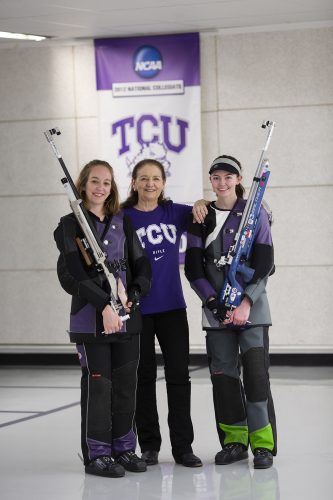
Head Coach Karen Monez, center, with champion shooters Elizabeth Marsh, left, and Kristen Hemphill. Marsh and Hemphill earned 2019 individual national championship titles, Marsh in smallbore and Hemphill in air rifle. Photo by Rodger Mallison
Hemphill started shooting at age 8 when her dad suggested she try the sport. “I was such a girly girl that all I ever wanted to wear was dresses,” she said. “I had to go buy a pair of jeans to shoot that day, and so from the beginning I didn’t want to do it.”
Her father was a competitive 4-H shooter and wanted to share his love of the sport with his children. Hemphill’s older sister was involved with the local shooting club, but Hemphill was drawn to other activities — she was on the cheer squad, played basketball and ran track.
But Hemphill’s attitude changed once she realized she had a talent for the sport. Her first official competition was the Texas State BB Gun Championship, which she won in 2009 at age 9 and again in 2010.
The sport has taken Hemphill to competitions around the world — a long way from her tiny hometown of Lohn, Texas, three hours southwest of Fort Worth with a population under 200.
Eventually Hemphill made the national rifle team. College recruiters came calling. Hemphill competed in the USA Shooting Nationals in Georgia in June, where she finished fourth, and the Junior World Cup in Germany in July. Besides TCU’s rifle program, Hemphill said, a large draw for her was the university’s nursing program. With support from coaches and the flexibility of the rifle program, she has been able to balance being a top collegiate athlete with the rigorous schedule of a nursing student.
Like Hemphill, Elizabeth Marsh is one of TCU Rifle’s star shooters. The junior computer information technology major won the 2019 NCAA championship’s smallbore individual title.
She often shoots a score in the 590-595 range, on a scale of 600. Her precision, she said, is partially because of her personal coach of eight years, Troy Bassham. She is the team’s only shooter to have a personal trainer in recent years.
When Marsh was 13, Bassham told her that he saw Olympic potential and a possible college scholarship. Marsh was hooked.
“For that kind of opportunity to basically just fall into my lap — I’m not letting this pass,” Marsh said. “I found Troy at such a young age, I got very good very quick.”
When Marsh started Olympic rifle shooting, she won the junior national championship in less than a year. She was 15. With that win, she said, college coaches flocked to her.
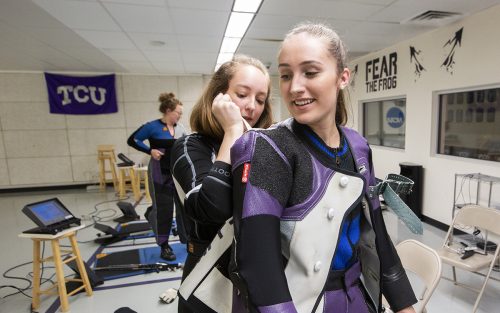
Elizabeth Marsh helps adjust the straps on the safety jacket of Catherine Miller at practice. Photo by Rodger Mallison
Marsh aims to fulfill Bassham’s U.S. Olympic hopes too. She trained this summer to compete in the first part of the U.S. Olympic trials. Bassham’s father, Lanny, won the gold medal in rifle shooting at the 1976 Olympic Games in Montreal.
Similar to her team, Monez learned of her sporting abilities as a girl. The coach was 14 when she joined a local junior club and not long after realized her shooting skills could take her places in the world.
Monez joined the U.S. Army Marksmanship Unit, eventually winning several titles, including individual medals at five World Cup competitions and eight individual titles at the U.S. International Shooting Championships.
“It provides the environment that you need to be in, continuing to improve your technical and mental skills and just the opportunity to travel at an international level,” she said.
Shooting competitions have taken Monez to 20 countries, including Italy and South Korea. “It’s a great opportunity to get to that level,” she said. “That’s why I’m very excited for this team’s members to have these goals, and I will encourage them in any way possible.”
Since shooting is a mental sport as much as a physical one, Monez trains her collegiate shooters to excel at focus and compartmentalization at the range. They must perform regardless of what is going on in their day.
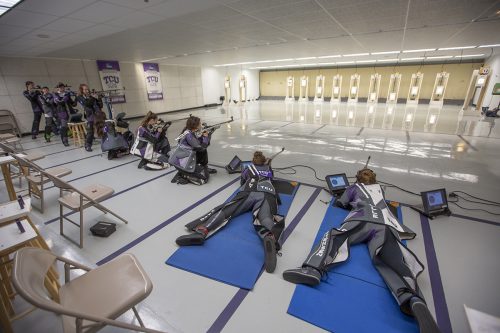
Members of the rifle team take their positions, including standing, kneeling and prone. Photo by Rodger Mallison
Her emphasis on an absolute ability to focus comes from her own coach when she was just starting out. Her coach told teenage Monez that she would become a great shooter as long as she didn’t “get too emotional.”
“At the time, I didn’t understand what he meant by that,” Monez said. “Over the years I came to understand what he was talking about — control your emotions or they’re going to control you, and that applies to so much of what we do, whether you’re competing or when you’re training.”
Hemphill and Marsh credit their mental training for their ability to hit their targets. And if they aren’t focused to their full potential, that can throw off their shots.
“There have been several times I haven’t been focused,” Marsh said. “Most of the time what happens is I will be more distracted during the competition, which leads to some small mistakes, but in this sport our shooting rings are millimeters apart, so small mistakes hurt a lot.”
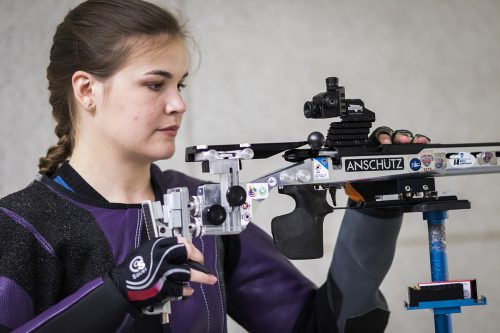
Rachel Garner readies her rifle at practice. Photo by Rodger Mallison
Since the sport is so repetitive, Marsh said that no matter the scenario — nationals or practice — just having a solid routine for setting up a shot and pulling the trigger are the most important parts.
Monez emphasizes this skill by repeating affirmations so that the shooters are always convinced they are good at what they do. So far, this coaching method has proved successful.
“When TCU is on the line,” Meili, the coach for Air Force, said, “you always know it’s going to be a fight to the finish.”
“It’s all a part of the mental skill,” Monez said. “The principle of reinforcement is the more you think about it, the more you write about it, the more you talk about something, the better the chances are that thing is going to happen.
“If that’s building a national championship team,” Monez said, “then that’s what I’m willing to do.”

Your comments are welcome
Comments
Related reading:
Features
Collegiate Rifle Rules and More
Learn the rifles, the time limits and scoring for NCAA teams.
Sports: Riff Ram
First Person with … Mindy Miles
The junior rifle shooter won the 2016 NCAA Sportsmanship Award for self-reporting a misfire.
Features, Sports: Riff Ram
Equestrian Team Is Ready for Another Run
After back-to-back final four finishes, TCU saddles up for a new year.